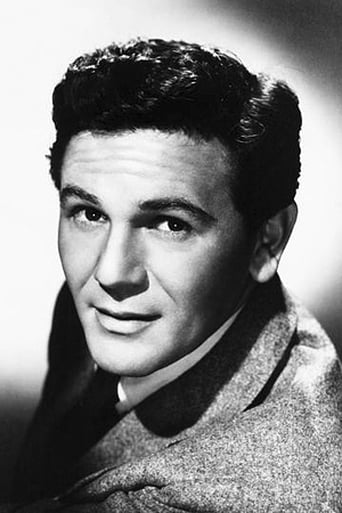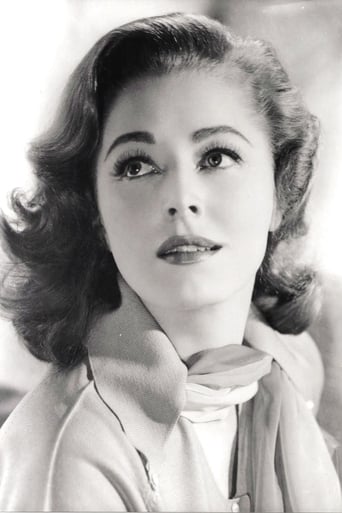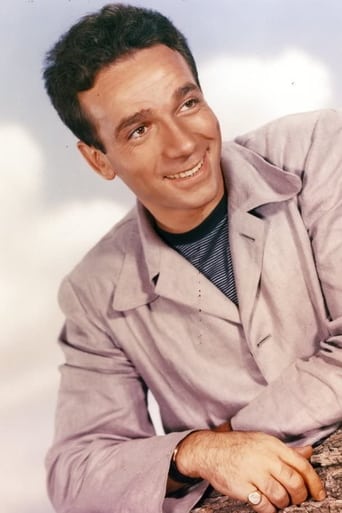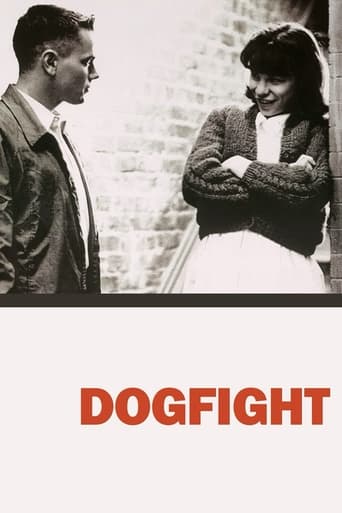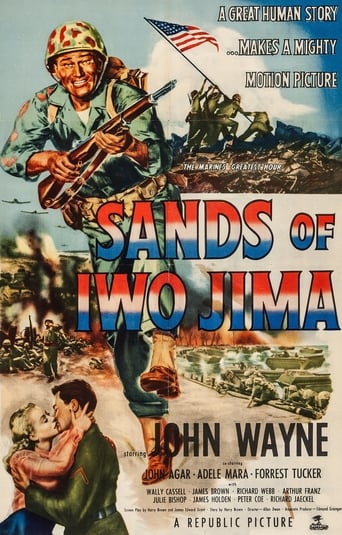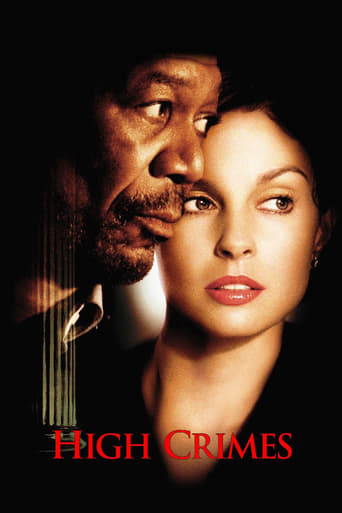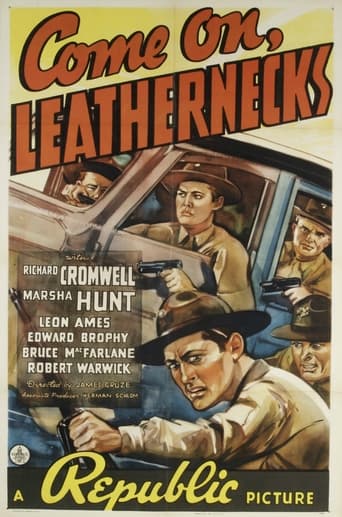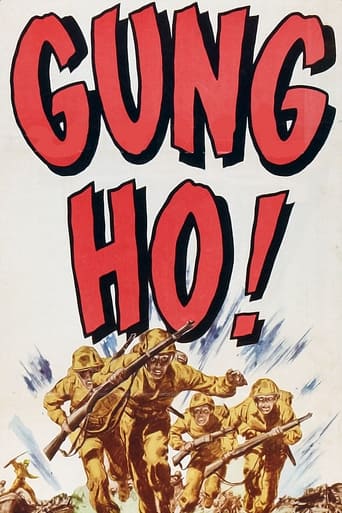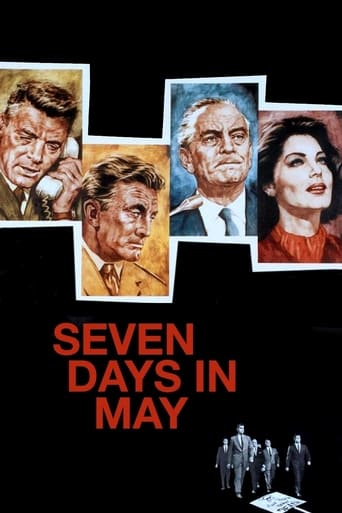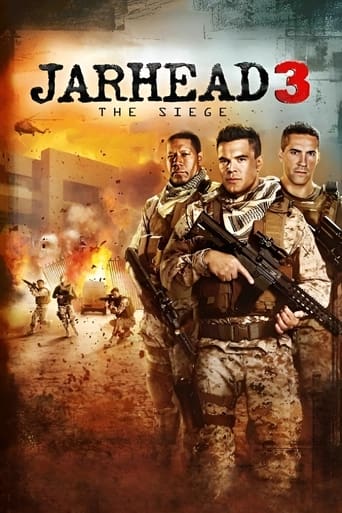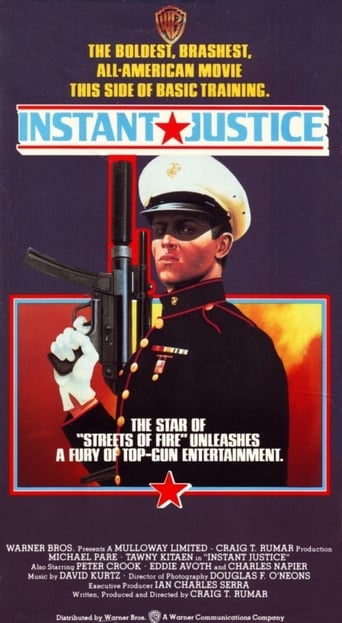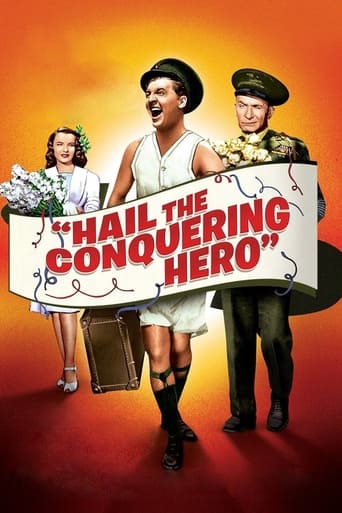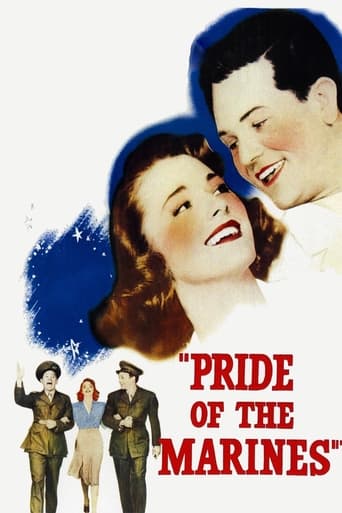
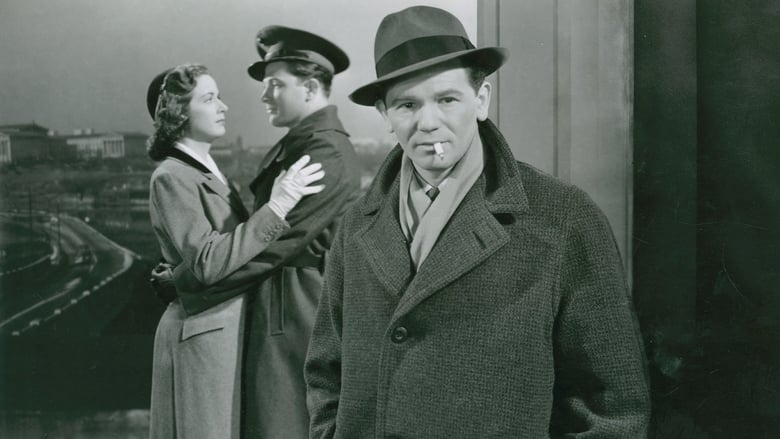
Pride of the Marines (1945)
Marine hero Al Schmid is blinded in battle and returns home to be rehabilitated. He readjusts to his civilian life with the help of his soon to be wife.
Watch Trailer
Cast


Similar titles
Reviews
This is one of the best movies I’ve seen in a very long time. You have to go and see this on the big screen.
Blistering performances.
The film never slows down or bores, plunging from one harrowing sequence to the next.
By the time the dramatic fireworks start popping off, each one feels earned.
John Garfield plays Al Schmid, a single friend of married couple Jim & Ella Merchant (Jim Ridgely and Ann Doran) and their teenage daughter Loretta (Ann Todd). Like happily married people are wont to do, they set Al up on a blind date, against his will, with Ruth Hartley (Eleanor Parker). But, after resisting getting involved with her, they begin dating.One day at Al's workplace, where he is a welder, he learns of a friend's enlistment into the Marines and decides to sign up himself. Ruth and Al have a last date, with Al insisting that she forget about him, given his unknown future. However, when she goes to meet his departure train, he is overjoyed and gives her an engagement ring.In the Battle of the Pacific, Al and his squadron find themselves in a foxhole assigned to prevent the Japanese from breaching their line at night. We briefly get to know several of the soldiers, including Lee Diamond (Dane Clark), before the attack. During the attack, many of them are killed but Al ends up single-handedly saving the day. However, he is wounded by a suicide bomber in the final scene of the battle.Later in a hospital, Al learns that he can't see, a condition that doesn't change even after he has surgery. Feeling sorry for himself, he dictates a letter through a nurse to tell Ruth that he is relieving her of any obligation to marry him. Though his friend Lee, the nurse, the doctors, and others try, he will not be convinced or persuaded to try to return to a "normal" life, given his condition. Instead, he stays in the hospital until they no longer allow him to remain there.He returns home on a train, with Lee in tow. However, he does not want to see Ruth and, when he does anyway, will not accept her undying love regardless of her encouraging words. He does not feel that he is a real man anymore, and his pride will not allow her to take care of him. But when he is awarded the Navy Cross for his service in the Pacific, and his vision allows him to "see" a fuzzy red-topped taxicab as Ruth escorts him afterwards, we get our happy ending.This film's Screenplay was nominated for a Best Writing Academy Award.
***SPOILERS*** On of the first WWII movies coming out of Hollywood that shows how the war effected those GI's, or in this case US Marines, who fought in it.21 year old Al Schmid, John Garfield, was just starting to live with a well paying job-earning some $40.00 a week-at the local steel mill and girl Ruth Hartley, Elenore Parker, whom he was about to marry when the Japs spoiled everything for him, and millions of likewise young Americans, by attacking the US Pacific Fleet at Pearl Harbor. Doing his duty as an American citizen Al immediately joined the US Marine Corps hoping to get back at the Japs knowing, correctly as it was to turn out, that the Marines would be the first American combat units to get a crack at them.Al finally got his chance when his unit, the 1st Marine Division, landed on August 7, 1942 at Guadalcanal in the far flung Solomon Islands to engage the Japanese who were were in control of it. It was during the battle of the Ilu River that Al almost single handed stopped a massive Japanese Banzai attack holding off, with his machine gun, wave after wave of suicide attacks by the determined Japs until help, or reinforcements, finally arrived. It was during the bloody fighting Al was hit in the face by a Jap grenade that ended up blinding him.Now back in the states convalescing at a naval hospital Al is faced with something far more harder to overcome then battling a battalion size attack of Japanese or German soldiers. He's faced with a future where he'll never see again and having to depend on others to look after, or for, him!We get to see in the film "Pride of the Marines" Al battle himself far harder then he did the Japanese troops on Guadalcanal in just coming to terms with his disability. Not wanting anyone, especially his girlfriend Ruth, to feel sorry for him Al in fact is the one who feels sorry for himself more then anyone else in the movie. It's with the help of Navy Nurse Virginia Pfeiffer, Rosemary DeCamp, and Ruth together with his US Marine buddy Lee Diamond, Dane Clark, that in the end gives Al the courage to face his blindness with the same strength that he faced wave after wave of Japanese troops on Gudalcanal. A courage Al thought he lost back in that God-forsaken island hell in the South Pacific.Based on the true story of US Marine Sergeant Albert Schmid "Pride of the Marines" showed what we were to expect from the tens of thousands of wounded US Servicemen coming back from the war. We get to see how it in many ways was far more difficult for those fighting the war to adjust to a peacetime America when they left something, like in the case of Al Schmid, behind on the battlefield. Al's battle with his personal demons was a lot harder then the Japanese that he fought in that they were part of him and thus had to fight himself in order to overcome and eventually defeat them. Despite the help that he got from both Nurse Virginia and his girlfriend Ruth as well as his Navy doctor-who has a striking resemblance to actor Gregory Peck-it still was up to Al to overcome the fears that he faced. Fears which he and only he had to both battle and overcome, like he was told by everyone in the movie, all by himself.
This is a great film Classic from the 40's and well produced. There are very dramatic scenes in this film with John Garfield,(Al Schmid),"Force of Evil",'48 and Dane Clark,(Lee Diamond),"Last Rites",'88, fighting the Japs during WWII being completely surrounded and with only one machine-gun. When Al Schmid was able to go home after being wounded with a horrible injury, his problems just started to begin with his family and engaged girl friend. Dane Clark gave an outstanding supporting role as Lee Diamond, who did everything to help his buddy Al get his life together again. There is never a complete victory to War and lets not forget all the Brave Wounded Military personnel in Veterans Hospitals from All the Wars and our present Iraq Vets!
This former Leatherneck appreciates more and more through the years John Garfield's gut-wrenching performance in the docu-drama PRIDE OF THE MARINES (1945), the true story of war hero Al Schmid who was blinded in combat on Guadalcanal by a Jap grenade. The picture, released a year before BEST YEARS OF OUR LIVES, was the first movie to deal in depth with the problems faced by returning vets. Scripted by Albert Maltz, who would eventually be jailed as one of the Hollywood 10, the film would catch major flack from Red-baiters at decade's end because of its politically-charged dialogue in one scene set in a veterans hospital, during which embittered soldiers forcefully voice both their hopes in and suspicions of a post-war society.The three layers of plotline dramatize an accurate microcosm of American life during a pivotal time period. PRIDE explores in its pre-war first part Garfield's lower-class, working-man roots as only he could portray urban struggles and dreams during the Great Depression. The harrowing middle portion, claustrophobically confined to a cramped and stinking Pacific island foxhole (shared with Dane Clark and Anthony Caruso to form a 3-man machine gun team), graphically captures the fears and horrors of war as few films have.But it is this citizen/soldier's readjustment in the final sequences, aided by compassionate nurse Rosemary deCamp and home-town fiancee Eleanor Parker (in a performance worthy of a Supporting Oscar nomination) that really packs an emotional wallop. Doubting his self-worth, lost in a sightless world (his post-operative cry of "Why don't God strike me dead!" is chilling), and struggling to comprehend the difference between love and pity, Garfield's perfectly modulated performance combines all the elements of his unique persona (rebellious icon, tough guy, romantic leading man, idealistic spokesman).Given his devotion throughout the war years to the Hollywood Canteen that he and Bette Davis created, the story must have been very close to his heart. This may be his finest screen role in a career filled with meaningful performances.


